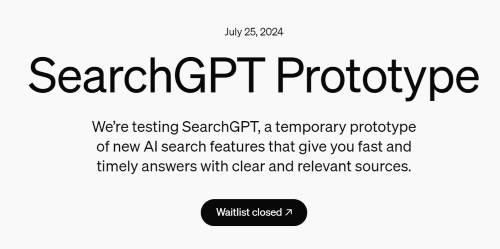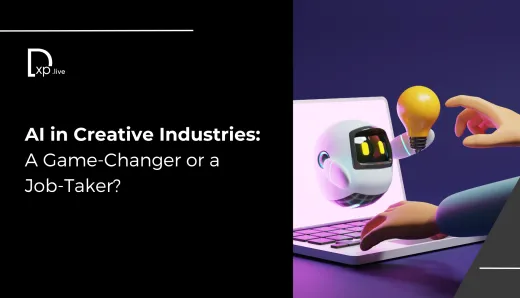SearchGPT: The Next Big Thing in Search? Here’s How to Prepare for the AI-Driven Revolution

The world of search is on the brink of a significant transformation with the introduction of SearchGPT by OpenAI. This new AI-driven search engine is currently in beta, and only a select few have access to it. However, its potential to disrupt the search landscape is immense. In this blog, we’ll explore what SearchGPT is, how it compares to Google, its implications for SEO, and why marketers need to start preparing now.

What is SearchGPT by OpenAI?
SearchGPT OpenAI is the latest innovation from OpenAI, known for developing the highly popular ChatGPT. This search engine is designed to harness the power of AI and natural language processing to deliver more accurate and contextually relevant search results. Unlike traditional search engines that rely heavily on keyword matching, SearchGPT understands and interprets the intent behind a query, offering a more personalized and human-like search experience.
How Does SearchGPT Work?
SearchGPT integrates large language models (LLMs) with traditional search engine algorithms to analyze and process vast amounts of data. It doesn’t just retrieve information based on keywords; it interprets the context, nuance, and even the tone of the search query. This means that users could potentially receive more accurate answers to complex queries, reducing the time spent sifting through irrelevant results.
Search GPT Launch Date: When Can We Expect It?
While Search GPT's launch date hasn’t been officially announced, the beta version is already creating a buzz in the tech community. The current beta testing phase suggests that OpenAI is fine-tuning the system before a broader release. Given the rapid pace of AI development, it’s likely that SearchGPT will be available to the public sooner rather than later, potentially within the next year.
SearchGPT vs Google: A New Era of Search?
The inevitable comparison between SearchGPT and Google raises the question: Will SearchGPT replace Google? Google has long dominated the search engine market, but SearchGPT introduces a novel approach to finding information that could challenge Google’s supremacy. Here’s how they stack up against each other:
- AI Integration: While Google has incorporated AI into its search algorithms, SearchGPT is fundamentally built on AI, making it more advanced in understanding user intent and providing contextually relevant results.
- Search Results: Google’s search results are based on a combination of keyword relevance, page ranking, and user data. In contrast, SearchGPT’s results are driven by its ability to understand natural language, potentially offering more nuanced and accurate answers.
- User Experience: SearchGPT aims to provide a conversational search experience, similar to interacting with a knowledgeable assistant. Google, on the other hand, focuses on delivering a broad range of information quickly, but often requires users to filter through the results to find what they need.
Will Search GPT Replace Google?
This is the million-dollar question. Will SearchGPT replace Google? The answer is complex. While SearchGPT offers innovative features, Google’s vast infrastructure, extensive data resources, and established user base make it a formidable competitor. However, SearchGPT’s ability to understand and process natural language more effectively could give it an edge in specific scenarios, particularly where personalized search experiences are desired.
For now, it’s unlikely that SearchGPT will fully replace Google. Instead, it may carve out its niche, appealing to users who prioritize AI-driven insights and personalized search experiences. The real question is how Google will respond to this new competitor and whether it will adopt similar AI-driven methodologies to maintain its dominance.
Search GPT for Chrome: Integration and Accessibility
One of the most intriguing possibilities is the potential for Search GPT for Chrome. If OpenAI decides to integrate SearchGPT with Chrome, it could significantly enhance the browser’s search capabilities.
Imagine a browser that not only finds information but also understands your browsing habits, preferences, and context, providing you with tailor-made search results.
Such integration would position SearchGPT as a direct competitor to Google’s search engine, which is deeply integrated with Chrome. However, this would also raise concerns about privacy, data security, and how much control users have over their search experiences.
What Does SearchGPT Mean for SEO?
The advent of SearchGPT presents both challenges and opportunities for SEO professionals. Traditional SEO strategies that focus on keyword optimization might become less effective as SearchGPT prioritizes user intent and context over specific keywords.
Here’s how SEO might evolve in the era of AI-driven search:
- Content Relevance: Instead of optimizing content for specific keywords, marketers will need to focus on creating content that addresses the intent behind user queries. This means understanding what users are truly looking for and providing comprehensive, relevant information.
- Natural Language: As SearchGPT is designed to process natural language, content that is written in a conversational tone and answers questions directly will likely perform better. This could lead to a shift away from rigid keyword optimization towards more fluid, human-like content.
- User Experience: SEO will increasingly be tied to user experience. Search engines like SearchGPT that prioritize context and intent will favor websites that provide a seamless and engaging user experience. This includes fast loading times, mobile optimization, and intuitive navigation.
- AI-Powered Tools: SEO professionals will need to leverage AI-powered tools to analyze search patterns, predict user behavior, and optimize content accordingly. These tools can help marketers stay ahead of the curve by providing insights into how AI-driven search engines like SearchGPT rank and prioritize content.
How to Get Ready for SearchGPT
The time to prepare for SearchGPT is now. Here’s how marketers can get ready for the shift:
- Stay Informed: Keep up with the latest developments in AI and search technology. Understanding how SearchGPT works and what it prioritizes will be crucial in adapting your SEO strategies.
- Focus on Intent: Shift your content strategy to focus on user intent rather than specific keywords. This means understanding the questions your audience is asking and providing clear, comprehensive answers.
- Embrace AI Tools: Start using AI-powered SEO tools that can help you analyze search patterns, predict user behavior, and optimize your content for AI-driven search engines.
- Enhance User Experience: Make sure your website is optimized for user experience. This includes ensuring fast loading times, mobile optimization, and intuitive navigation.
Conclusion: The Future of Search is AI-Driven
SearchGPT is set to revolutionize the way we search for information. While it may not replace Google entirely, it will certainly change the landscape of search engines and how marketers approach SEO. The key to success in this new era is to stay informed, adapt your strategies, and embrace the power of AI. The future of search is AI-driven, and the time to prepare is now.




